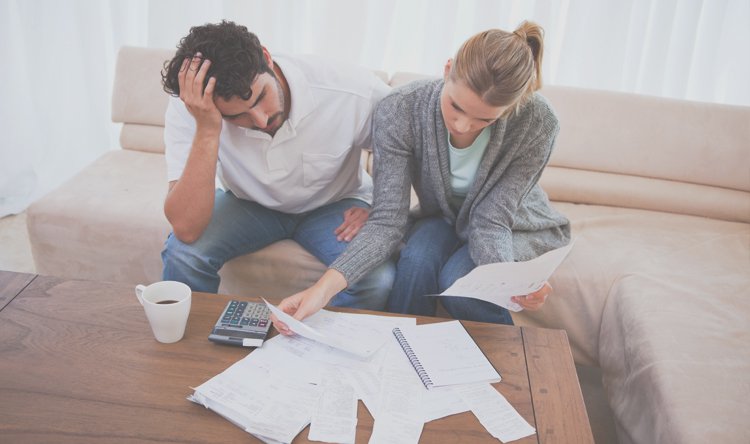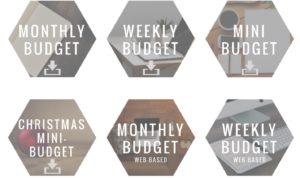Help! I Can’t Pay My Bills

“I can’t pay my bills!”
How many of you have said this recently? Have you heard friend or family member say this?
Unemployment rates a skyrocketing, more lay offs are being announced daily, and pay cuts are now seemingly common. Many people are finding themselves in a situation where they can’t pay their bills.
Before this current financial crisis 40% of Americans said they couldn’t handle an unexpected expense of $400 or more. What do you do when the world economy is in a state of suspended animation?
This is post is written for those who are struggling mightily with their finances and tough decisions are being made about who will be paid and who will not be paid.
These practical steps and tools can help you walk out of this situation and into financial freedom.
Step 1 – Prepare A Written Spending Plan
There is so much power in a written spending plan! I never realized where all of my money was going until the day that I began planning my spending.
You might say, “But Joe, I know that I can’t pay my bills. My expenses are more than my income so why should I even bother with preparing a spending plan?”
I would respond with this answer. “It is hard to slay a dragon if you do not know how many heads it has!” A spending plan will ensure that you know the ACTUAL situation instead of the IMAGINED situation.
Prepare your plan – even if you know it is going to be awful. This is the start of your journey to financial freedom!
You can access the free budget tools HERE to get started on your plan.
Step 2 – Ask Questions
It is extremely important to ask questions that help define the true root cause of the issue.
When I am counseling someone experiencing this sort of situation, I have a series of questions I ask to help me grasp the issues. Here are some of the questions for which I am seeking answers. These are not in any particular order.
-
“What was the cause of this situation?”
Ultimately, I am trying to determine if the current situation is the result of a long series of financial decisions or the result of a catastrophic event (job loss, medical issue without insurance, death of income provider, etc.).
-
“Is this an INCOME or an OUTGO issue?”
I want to see where the money is going. That is why Part 1 is so important. The spending plan will help you more clearly determine the answer to this question. From experience, I have seen that it is an OUTGO issue in most cases.
-
“What are the required debt payments?”
Is this unsecured revolving debt (credit cards) or is this installment debt on an asset (car, boat, motorcycle, etc.)? This question will be key for Step 3 of this post.
-
“Is there something that can be sold?”
If there are items that can be sold, this needs to be fully investigated to understand how it can help the situation. Selling something like a motorcycle can help bridge your “gap” to help you prevent racking up debt.
-
“What expenses can be stopped?”
Are there any “extras” in the OUTGO? One example of this are nonessential subscription services like Netflix or Hulu.
-
“How can INCOME be increased?”
An extra job or tons of overtime may not be appealing, but living in a squalor of debt with no hope is even worse! It is very important to investigate short-term ways to increase income to get out of the current late bill payment situation.
Step 3 – Prioritize Your Bills
When the financial sky is falling down and the walls are closing in on you, it is imperative that spending is prioritized. Here is my suggested order of priority for spending when there just is not enough to pay everything.
1. Housing
You must take care of the mortgage and utilities first. Now if the mortgage payment has run out of control and it is 60% of one’s take home pay, then it is high time that the house be sold or income be tripled within a couple of months.
2. Food & Prescription Medication
I am going to eat before one single bill is paid! We must be able to eat. I am not talking about Olive Garden or fast food. I am talking about groceries bought with coupons and much attention to frugality. Likewise, I need to make sure my family has the medication they need.
3. Transportation
If transportation is required to produce income, then it is imperative that the vehicle payments, insurance, taxes, gasoline, and maintenance be funded. If you have an expensive car payment you may need to trade your vehicle for something with a lower payment or no payment at all.
4. Back Taxes
Owing the government back taxes is a terrible thing, and it must be addressed. I would rather owe anyone besides owing Uncle Sam!
5. Secured Debts
If there is additional money remaining after housing, food, and transportation are taken care of, it is time to pay the secured debt payments. This is debt where the lender can come take something – like a car, boat, motorcycle, tractor, etc. If the lender repossesses the item, they will sell it at a wholesale auction and come after you for the difference.
6. Family & Friends Debts
If you owe family and friends, and you still have some money left, it is essential to pay on debts owed to them. Unpaid debts to family and friends have been the cause of untold relationship issues since time began. Avoid this!
7. Unsecured Debts
It is time to address the unsecured debts. Credit cards, student loans, signature loans, etc.
One thing to note is that unsecured debt holders will be screaming and hollering the loudest because there is nothing they can come take from you. As a result, they will try to play upon your emotions to get you to pay them before you pay anyone else.
And it works! I have met with a lot of people who have kept their credit cards current while letting the house payments fall behind. Not good!
Go back to the spending plan you have prepared and ensure that your priorities are in order. When you run out of money you stop paying bills. Communicate kindly with those you can’t pay at this time that you want to repay your debts, and have a plan to do so.
Step 4 Take Action!
When you find yourself in a place where you can’t pay your bills don’t stop!
I have found that whenever I am overwhelmed, I move toward doing nothing. I just want to shut down and ignore everything. Running away feels like the right thing to do.
Yet, the FACT is that running away will just make the situation worse. Will it be extremely difficult to work through this situation? AB-SO-LUTE-LY! But the cost of NOT doing something is even more difficult! You CAN do this.
Below are some practical tips that have worked for me when I have wrestled with overwhelming situations.
-
Create an Action List of Payments
I prepare a list of items and prioritize them. Identify who you need to call to communicate that you can’t pay them at this time. All those that you are going to pay, list what actions you have to take to do so (ie what are you going to sell or what expenses are you eliminating so you have money to make those payments).
-
Establish Financial Accountability
I find someone who I trust who will hold me accountable to my actions. They can encourage you as you make difficult choices along the way.
-
Seek Help
Seek help from a financial coach who can help you prepare a budget.
We have trained over 4,000 financial coaches across the US and Canada. You can email us on the I Was Broke. Now I’m Not. Contact Page. We will connect you with a one of the churches where we’ve trained coaches, and they will meet with you for free.
Our counselors are winning with their money and are passionate about helping folks do the same!
“I Can’t Pay My Bills” but I CAN Do Something!
Not being able to pay your bills can feel crippling, but I want you to know that you CAN help your situation.
Let’s review our four steps .
First, write it down so you know what situation you are actually facing, instead of what you imagine you are. Second, ask yourself those six questions. Third, prioritize your bills in order to figure out who will be paid and who can’t be. Finally, take action!
We want to be able to help you along the way. Visit our Next Steps and Tools pages on our website for free resources to equip you on your journey.
By identifying your gap and taking action it will allow you to maximize the dollars you do have and minimize how much you spend. These actions will enable you to prosper on the other side of this. You can do this!
For more resources to help you with your finances during the COVID-19 pandemic visit our website.


